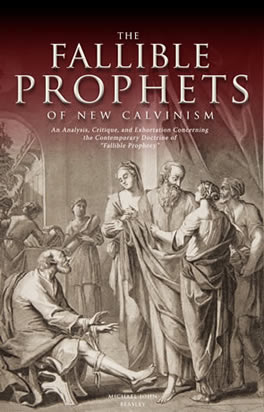The Fallible Prophets of New Calvinism
The Fallible Prophets of New Calvinism: An Analysis, Critique, and Exhortation Concerning the Contemporary Doctrine of "Fallible Prophecy"
 This book examines Dr. Wayne Grudem's controversial teaching on fallible prophecy, in view of various lexical, exegetical, and historical points of interest. It also addresses the teaching's popularity and continuing advancement through many within the "New Calvinism" movement.
This book examines Dr. Wayne Grudem's controversial teaching on fallible prophecy, in view of various lexical, exegetical, and historical points of interest. It also addresses the teaching's popularity and continuing advancement through many within the "New Calvinism" movement.
The concepts presented within fallible prophecy do more than merely shift the meaning of prophecy from the standard of Old Testament revelation – they completely reverse the meaning of prophecy altogether. Within the system of fallible prophecy the modern prophet is not seen as infallible, but is now considered to be fallible. The lexical argument for this conclusion comes from the most extreme uses of the secular Greek language along with other extrabiblical sources. Thus, the advocates of fallible prophecy are arguingthat the 1st century readers of the NT would automatically see the word prophecy as having diametrically opposed meanings when referring to Old Testament prophecy (infallible) versus New Testament prophecy (fallible). By retooling the meaning and definition of such a central word as prophecy, the doctrine of fallible prophecy creates a host of doctrinal problems and points of confusion within the church, raising questions about the nature of God who promises that His revealed word will not return to Him empty without accomplishing what He desires (Isaiah 55:11).
Below is a summary of the what is covered in The Fallible Prophets of New Calvinism, beginning with the Table of Contents:
Introduction: A Primer on Prophecy
Chapter I: Prophecy - A Test of Love
Chapter II: Fallible Prophecy – Lexical Concerns
Chapter III: Fallible Prophecy – The Case of Agabus
Chapter IV: Fallible Prophecy – A Gift for All?
Conclusion: The Fallible Prophets of New Calvinism
• By restructuring the ancient definition of prophecy, the doctrine of fallible prophecy effectively re-labels what the Scriptures define as a false prophet. This dangerously opens the door of the church to "enthusiasts or deceivers." Moreover, the Old Testament and New Testament Scriptures remind us that there are prescribed tests that must be employed in order to determine if a prophet was true or false. Such tests not only revealed the character of the supposed prophet, but they especially exposed the affections of those who either applied or ignored such tests. It is my contention that the redefinitions supplied by the doctrine of fallible prophecy nearly eradicate such prescribed tests, thus exposing the body of Christ to innumerable temptations and dangers.
• Within the system of fallible prophecy, members are instructed to sift through the words of any prophecy with the understanding that an admixture of truth and error will flow from the "legitimate" NT prophet. Depending on the nature of such an admixture, some or all of a spoken prophecy could be rejected based upon such an analysis. Apart from a clear contradiction to Scripture, personal prophecies have little objective criteria by which they can be measured, leaving the hearer with a great potential for confusion and uncertainty.
• In light of the above point, it should be noted that the consciences of believers can be unnecessarily bound by supposed prophecies that cannot be fully and objectively evaluated. Thus, believers who are prophetically exhorted to make significant choices are left with the task of discerning if it is the Holy Spirit, or the "fallible prophet," who has spoken to them. In view of this, there is a great potential for doubt and uncertainty among those who desire to obey God under the guidance of fallible prophecy.
• Within the doctrine of fallible prophecy, Agabus is traditionally utilized as the central example of a NT fallible prophet. However, there are several inconsistencies concerning the interpretation and application of his example. If Agabus' example was followed logically (according to the logic of fallible prophecy), then no fallible prophecy would ever require obedience from a believer due to the corrupting presence of error. This reality guts fallible prophecy of any positive value or purpose whatsoever.
• From the standard of Scripture, it was no small thing for a person to claim to be a prophet of God. The Bible explicitly affirms only two classes of prophets: true prophets and false prophets. In the Old Testament, the penalty of death fell upon those who falsely claimed such a gift and office. However, according to the doctrine of fallible prophecy, neither grave error nor immaturity should serve as a barrier to the exercise of such a gift by nearly everyone within the local church. Such thinking is a tragedy for the body of Christ which is called to holiness and truth in all aspects of life and servitude.
• In the New Testament we see repeated lessons on the supremacy of the New Covenant over the Old Covenant, yet how does a degraded form of prophecy (fallible New Testament prophecy) demonstrate such supremacy?

